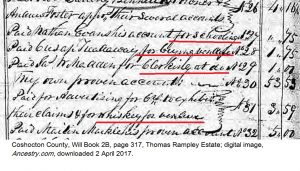Expenses paid out by an estate provide unique insight into the a family’s life. For those of us without letters, diaries, or journals, records of estate payments offers a perspective on our ancestors’ lives that we might not get elsewhere. Such is the case with the settlement of the Thomas Rampley estate in Coshocton County, Ohio, in the 1820s. One of the last records in the case was the list of bills paid by the estate’s administrator.
Nathan Evans was paid $.75 “for schooling.” There is no indication ho w many children this involved or for how long. It goes suggest that at least rudimentary schooling was important to the Rampley family–at least important enough for them to pay for it.
w many children this involved or for how long. It goes suggest that at least rudimentary schooling was important to the Rampley family–at least important enough for them to pay for it.
Crispin Tredway who came with the Rampleys to Ohio from Harford County, Maryland, in 1817, was the auctioneer when Thomas Rampley’s goods were sold in 1824 after his death. Crispin was paid $1.75 for “Crying Vendue,” or serving as the auctioneer at the estate sale when it was held in 1824.
$3.59 was paid for advertising the auction and for providing whiskey at it as well. The items are group as voucher 29. Voucher 30 (“My own proven account”) was paid to James Shores, the administrator, apparently to whom the “my” refers. Shores was also Thomas’ son-in-law and it seems logical that he would pay some of the auction expenses up front and seek reimbursement.
Whether it increased the prices of items, I can’t say, but alcohol was not uncommon at auctions in the early 19th century.
It was probably less common to use the word “vendue” in the accounting of the estate.